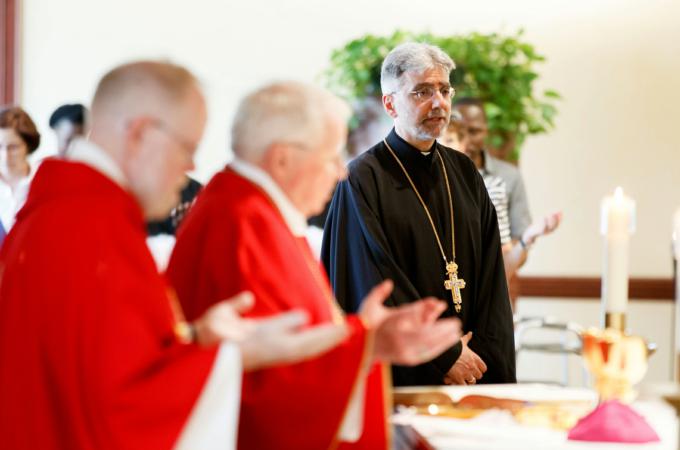Greek Orthodox delegate joins archdiocese's celebration of Sts. Peter and Paul
BRAINTREE -- In keeping with an ecumenical tradition shared by Boston's Catholic and Greek Orthodox communities, Father Demetrios Tonias, dean of Annunciation Greek Orthodox Cathedral of New England, participated in and spoke at a Mass at the Pastoral Center on June 28, the eve of the feast of Sts. Peter and Paul.
Each year, the ecumenical patriarch of Constantinople sends a delegation to the Vatican on the June 29 feast of Sts. Peter and Paul, patrons of Rome. The pope likewise sends a delegation to the patriarchate for the Nov. 30 feast of St. Andrew, patron of Constantinople.
Since 1996, the leaders of the Greek Orthodox Metropolis of Boston and the Roman Catholic Archdiocese of Boston have mirrored this tradition on the local level by exchanging delegates to participate in the observance of those feast days.
"It's not just a recognition, it's a participation, on the local level, in what is happening on the universal level," said Vito Nicastro, associate director of the Office for Ecumenical and Interreligious Affairs, July 8.
He said the "treasure of a relationship" between the Orthodox Church and Catholic Church in Boston "is not something that one person can take credit for. It's been built, really, over generations, but especially over the last couple of decades."
Bishop Arthur Kennedy, director of the Office for Ecumenical and Interreligious Affairs, presided over the June 28 Mass at the Pastoral Center.
Father Tonias spoke about Sts. Peter and Paul, who he said both possessed "inner strength and strong faith" and were "unperturbable in their steadfast devotion and beliefs."
"Each possessed supreme self-confidence. Peter in his belief that Christ was God and Paul in his belief that he was not. Peter in his belief that he would never deny Christ and Paul in his belief that he would never accept him. Both were wrong," Father Tonias said.
He said what made the saints great "was not their ability to see the error of their ways" but rather "their ability to do something about it."
"Peter and Paul stand before us today as preeminent icons of repentance and their example shines before us as an image, not only of their ability to change, but of God's infinite capacity to forgive," Father Tonias said.
He compared Peter and Paul to other biblical figures that had close interactions with Christ but chose not to seek forgiveness, such as Judas Iscariot and the Pharisees.
"Both Peter, who denied Christ, and Judas, who betrayed him, felt remorse for their actions, but only Peter truly repented," Father Tonias said, adding that if Judas had repented, cathedrals would be named after him today.
Father Tonias said Peter and Paul possessed "essential qualities necessary for repentance."
"They were able to set aside their own preconceived notions and accept Christ our God as he presented himself to them, not as they envisioned him. They were able to humble themselves and accept their errors and own their mistakes, rather than make excuses for them as so many of us do on a daily basis. They were able to trust in his great mercy and love for humanity, rather than assuming that their sin was too great to be forgiven," Father Tonias said.
He spoke of the tendency to excuse sin and deny personal responsibility for sin. He said Peter and Paul demonstrate how to "accept our sin, so we can allow God to set us free from it."
"The 'rock' that is Peter shows us how God can transform fearful denial into courageous proclamation. The 'trumpet' that is Paul shows us how he can change fearsome invective into fearless evangelization. The rock and the trumpet show us 'the way' to forgiveness and salvation," Father Tonias said.
In Rome, Archbishop Job of Telmessos led the delegation sent by Ecumenical Patriarch Bartholomew of Constantinople for the patronal feast day. The pope gave Archbishop Job a gift for Patriarch Bartholomew: a reliquary containing bones that were excavated from St. Peter's tomb and believed to be his relics.
"These relics are among the most important relics in the world. To give them to the Orthodox is an incalculable gift. But it's more than just an important gift, and it's more than just healing historical wounds of memory. And it's more than just building up and assisting the spiritual life of each other. It's sharing in devotion to the saints," Nicastro told the Pilot.



















